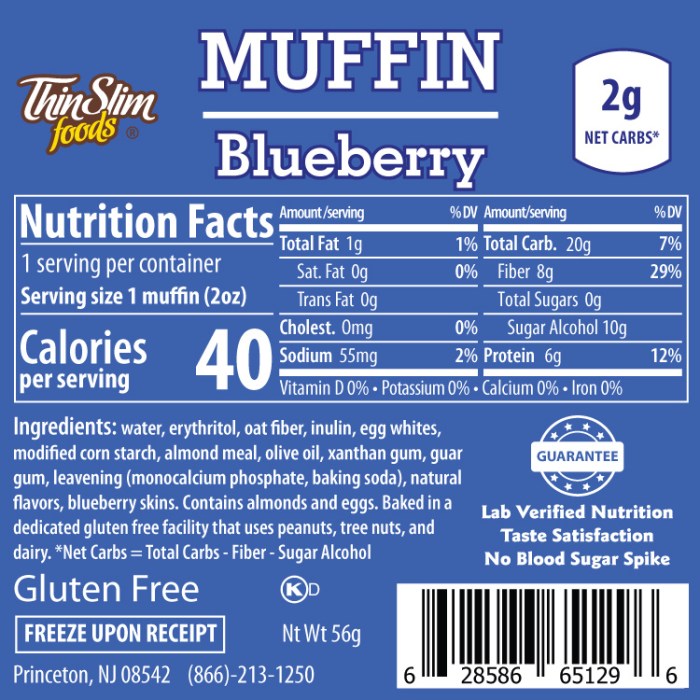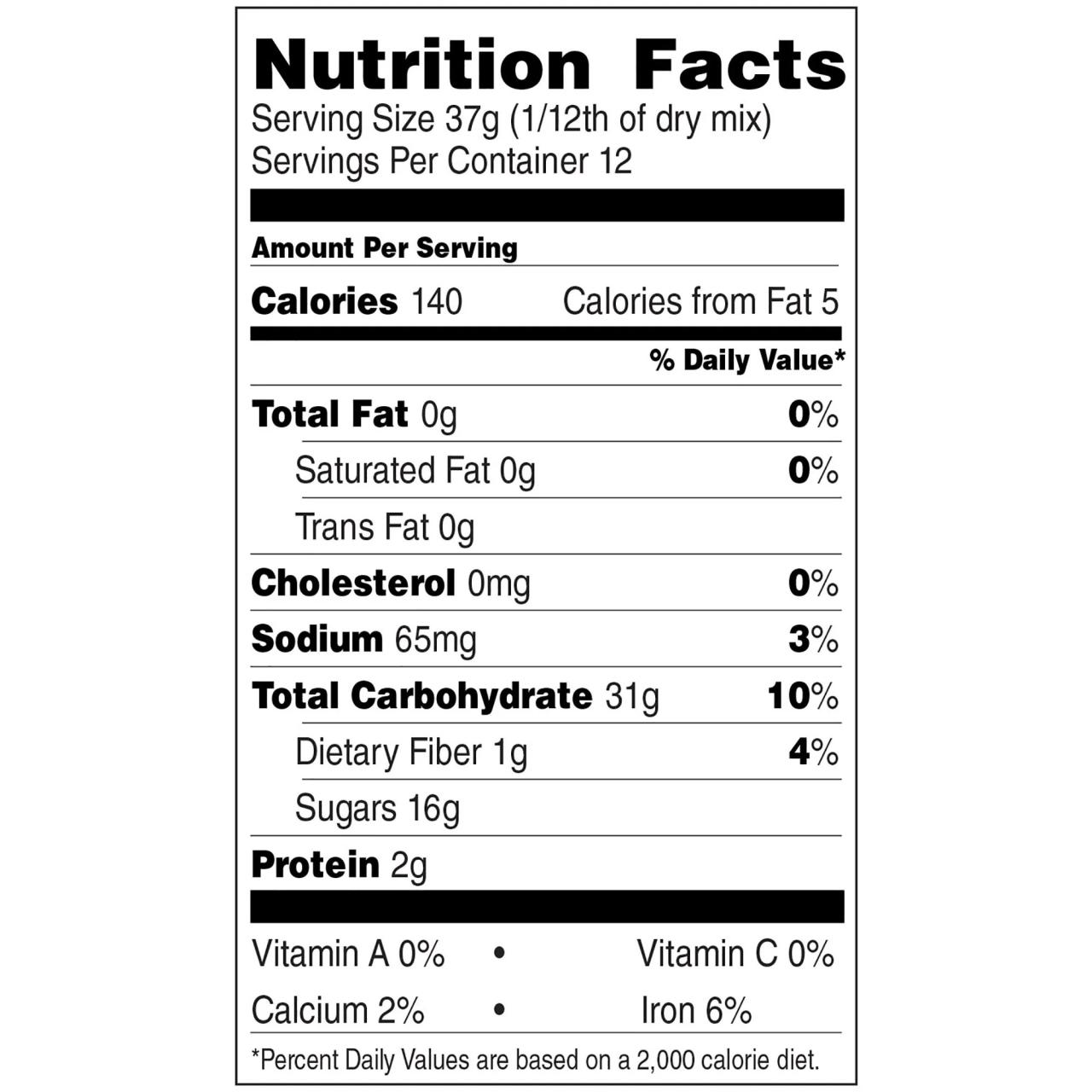Nutritional Composition of Blueberry Muffins: Blueberry Muffin Nutrition Facts
Blueberry muffin nutrition facts – Blueberry muffins, a beloved breakfast or snack item, offer a blend of sweetness and nutritional components. However, the nutritional profile can vary significantly depending on the recipe and ingredients used. This section details the typical macronutrient and micronutrient composition of a standard blueberry muffin, providing a clearer picture of its nutritional value.
Macronutrient Breakdown in Blueberry Muffins
The macronutrient content of a blueberry muffin primarily consists of carbohydrates, proteins, and fats. The exact amounts can fluctuate based on factors such as the type of flour, added sugar, and the quantity of blueberries. The following table presents a typical breakdown per serving (approximately one medium-sized muffin):
| Nutrient | Amount per serving (grams) | Percentage of Daily Value | Units |
|---|---|---|---|
| Carbohydrates | 30-40 | 10-15% | grams |
| Protein | 3-5 | 5-10% | grams |
| Fat | 5-10 | 8-15% | grams |
*Note: Daily Value percentages are estimates and may vary based on individual dietary needs and calorie intake.*
Micronutrient Content of Blueberry Muffins
Beyond macronutrients, blueberry muffins contribute to the daily intake of several essential micronutrients. The blueberries themselves are a significant source of many of these vitamins and minerals. However, the overall micronutrient content is influenced by the recipe and the quality of ingredients.
- Vitamin A: Blueberry muffins provide a small amount of Vitamin A, contributing to vision health and immune function. The amount varies depending on the type of flour and added ingredients.
- Vitamin C: Blueberries are a good source of Vitamin C, an antioxidant that supports immune system health. A muffin’s Vitamin C content is largely dependent on the blueberry quantity and processing methods.
- B Vitamins: These vitamins, crucial for energy metabolism and nerve function, are present in varying amounts depending on the ingredients used in the muffin recipe. Whole wheat flour, for instance, can contribute more B vitamins than refined white flour.
- Calcium: The calcium content is modest and primarily comes from the milk or dairy products (if any) included in the recipe.
- Iron: Iron content is generally low unless the recipe incorporates iron-rich ingredients, such as whole grains.
- Potassium: Blueberries contribute to the potassium content, an electrolyte essential for fluid balance and nerve function.
Fiber Content and Digestive Health
Blueberry muffins, particularly those made with whole wheat flour, offer a source of dietary fiber. Fiber is essential for digestive health, promoting regularity and aiding in the prevention of constipation. It also contributes to feelings of fullness, potentially aiding in weight management. The amount of fiber varies significantly based on the type of flour used. Whole wheat flour muffins generally have considerably more fiber than those made with refined white flour.
A serving of a whole wheat blueberry muffin could provide up to 3-5 grams of fiber, a significant contribution towards the recommended daily intake. Adequate fiber intake is crucial for maintaining a healthy gut microbiome and preventing various digestive issues.
Calorie Content and Serving Size

Understanding the calorie content of a blueberry muffin is crucial for managing your daily caloric intake. A standard blueberry muffin, typically weighing around 120-150 grams, contains a variable number of calories depending on the recipe and ingredients used. This variation makes it important to check the nutritional information provided on the specific muffin’s packaging.The calorie count of a blueberry muffin is largely determined by its size and ingredients.
A larger muffin naturally contains more calories than a smaller one. Similarly, the type of flour, the amount of sugar, and the type of fat used all significantly impact the final calorie count. For example, using whole wheat flour instead of refined white flour can slightly increase the calorie count but also boost the fiber content. Adding more sugar dramatically increases calories, while substituting butter with a healthier fat like olive oil might slightly alter the calorie count but also influence the flavor and texture.
Calorie Comparison with Other Breakfast Options
The following table compares the calorie count of a standard blueberry muffin (approximately 120g, 350 calories) to other common breakfast choices. These values are approximate and can vary based on brand and preparation. Note that “calories per gram” is calculated by dividing the total calories by the serving size in grams.
| Food Item | Serving Size (grams) | Calories (approximate) | Calories per gram (approximate) |
|---|---|---|---|
| Blueberry Muffin | 120 | 350 | 2.9 |
| Whole Wheat Toast (2 slices) | 50 | 150 | 3.0 |
| Cereal (1 cup) | 30 | 100-150 | 3.3-5.0 |
| Plain Yogurt (1 cup) | 250 | 150 | 0.6 |
Impact of Ingredients on Calorie Count
The choice of ingredients significantly affects the overall calorie count of a blueberry muffin. Using refined white flour contributes to a higher calorie count compared to whole wheat flour, which offers more fiber and nutrients. The amount of added sugar directly correlates with the calorie content; a recipe with less sugar will result in a lower calorie muffin.
The sweetness of blueberry muffins, a fleeting comfort, hides within its crumbly depths a nutritional profile often overlooked. A stark contrast emerges when we consider the less wholesome, yet undeniably tempting, nutrition facts corn dog , a reminder of simpler, less health-conscious times. Returning to the blueberry muffin, its delicate balance of fruit and flour, a bittersweet reflection on choices made and paths taken.
Finally, the type of fat used, whether it’s butter, oil, or shortening, affects both the calorie density and the overall nutritional profile of the muffin. For example, a muffin made with butter will generally have a higher calorie count than one made with olive oil, due to the higher fat content and calorie density of butter. A recipe using less fat will inherently have fewer calories.
Blueberry Muffin and Dietary Considerations

Blueberry muffins, a beloved breakfast or snack item, present a delightful balance of sweetness and texture. However, their nutritional profile and ingredients warrant careful consideration for individuals adhering to specific dietary needs or restrictions. Understanding the muffin’s composition allows for informed choices and potential modifications to accommodate diverse dietary preferences.
Dietary restrictions and allergies significantly impact food choices. Many individuals must navigate gluten-free, vegan, or low-sugar lifestyles, requiring careful scrutiny of ingredient lists and potential adaptations to standard recipes. Similarly, awareness of common allergens, such as nuts and dairy, is crucial for preventing adverse reactions. Adapting recipes to meet these needs often requires substituting ingredients while maintaining the desired flavor and texture.
Suitability for Various Dietary Restrictions
The suitability of blueberry muffins for various diets depends heavily on the recipe. Standard recipes often include ingredients incompatible with certain dietary restrictions. Careful ingredient selection and substitution are key to creating inclusive options.
- Gluten-Free: Traditional blueberry muffins contain wheat flour, making them unsuitable for those with celiac disease or gluten sensitivity. Gluten-free alternatives, such as almond flour, oat flour (certified gluten-free), or a blend of gluten-free flours, can be substituted. The resulting texture might differ slightly, but the flavor remains largely intact.
- Vegan: Many recipes incorporate eggs and dairy products for binding and richness. Vegan alternatives include applesauce, mashed banana, or flax eggs (ground flaxseed mixed with water) for binding, and plant-based milks (such as almond or soy milk) and vegan butter for richness and moisture.
- Low-Sugar Diets: Reducing the sugar content requires careful consideration. Using alternative sweeteners like stevia or erythritol can reduce the overall sugar content, but the intensity of sweetness might differ. Increasing the amount of blueberries can also add natural sweetness and reduce the need for refined sugar.
Potential Allergenic Ingredients and Recipe Modifications
Blueberry muffins, while seemingly simple, contain several ingredients that can trigger allergic reactions. Awareness of these ingredients and appropriate substitutions are crucial for creating safe and enjoyable muffins for individuals with allergies.
- Nuts: Many recipes include nuts in the batter or as a topping. Individuals with nut allergies must strictly avoid recipes containing nuts. Sunflower seeds or pumpkin seeds can provide a similar textural element as a topping.
- Dairy: Butter and milk are common ingredients. Vegan butter and plant-based milks are readily available substitutes for those with dairy allergies or intolerances.
- Eggs: Eggs provide binding and richness. Flax eggs, applesauce, or mashed banana can serve as effective replacements.
Creating a Healthier Blueberry Muffin Recipe, Blueberry muffin nutrition facts
A healthier blueberry muffin recipe emphasizes reduced sugar, increased fiber, and the use of whole grains. These modifications enhance the nutritional profile while maintaining the deliciousness of the classic treat.
- Ingredients: 1 ½ cups whole wheat flour, ½ cup rolled oats, 1 teaspoon baking powder, ½ teaspoon baking soda, ¼ teaspoon salt, ½ cup unsweetened applesauce, ¼ cup maple syrup, 1 teaspoon vanilla extract, 1 cup unsweetened blueberries, ¼ cup milk (dairy or non-dairy).
- Instructions: Preheat oven to 375°F (190°C). Combine dry ingredients (flour, oats, baking powder, baking soda, salt) in a large bowl. In a separate bowl, whisk together wet ingredients (applesauce, maple syrup, vanilla extract, milk). Gently fold wet ingredients into dry ingredients. Fold in blueberries.
Fill muffin tins about ¾ full. Bake for 18-20 minutes, or until a toothpick inserted into the center comes out clean.
Frequently Asked Questions
Are blueberry muffins a good source of antioxidants?
Yes! Blueberries themselves are packed with antioxidants, which are beneficial for health. The amount in a muffin depends on the number of blueberries used.
Can I make blueberry muffins gluten-free?
Absolutely! Just substitute all-purpose flour with a gluten-free blend. Make sure to check all other ingredients for gluten as well, as cross-contamination can occur.
How can I reduce the sugar in my blueberry muffins?
Use less refined sugar, experiment with alternative sweeteners like mashed banana or applesauce, or increase the amount of blueberries for natural sweetness.
Are blueberry muffins suitable for diabetics?
It depends on the recipe and portion size. Diabetics should carefully monitor their blood sugar levels and choose muffins with less added sugar and higher fiber content. Consulting a doctor or registered dietitian is always a good idea.
